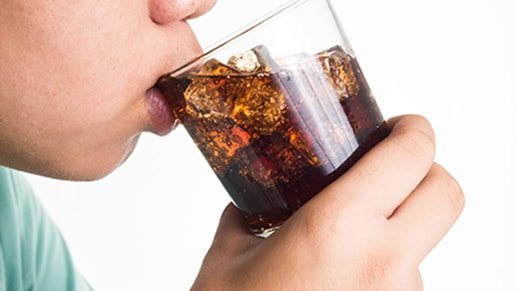Risk Factor: Soda

Soda poses a huge threat to your oral health. With every swig of this sugary drink, a damaging reaction takes place in your mouth that lasts up to 20 minutes. Nearly one in five Americans drink at least one soda per day.
When you drink a soda, the sugars from the soda interact with the bacteria in your mouth and form an acid that attacks your teeth. Sugar-free or diet sodas are not exempt from this. They contain their own acids that attack teeth.
Erosion and cavities are the main effects that drinking soda has on your teeth. Erosion happens from the wear and tear the acid takes on your tooth enamel. Enamel is the protective, shiny layer on your teeth. Soda damages not only your tooth enamel but also the next layer called dentin, as well as composite fillings. Cavities can occur due to the damage to your tooth enamel. Erosion and cavities happen faster when soft drinks are regularly consumed, combined with poor oral health practices.
The average can of soda has 9 1/3 teaspoons of sugar in it; this is over the recommended amount of 6 teaspoons (women) and 9 teaspoons (men) from the American Heart Association. The recommended average for children is 4 teaspoons. Soda has over double that! Children are especially prone to the destruction of tooth enamel because theirs is not yet fully developed.
If you are going to drink a soda, here are some oral health recommendations:
- Sprite®, Diet Coke®, and Dr. Pepper® are some of the least acidic sodas, though they are still acidic.
- Limit yourself to one soft drink a day.
- Drink quickly. The more exposure time the drink has on your teeth, the more time sugars and acids have to attack your teeth.
- Rinse your mouth out with water after drinking a soda. This will help wash away remaining sugars and acids.
- Do not brush your teeth right away. This will cause more damage to recently acid-attacked teeth.
- Use a straw to help keep harmful sugars and acids from contacting your teeth.
